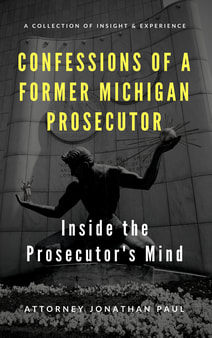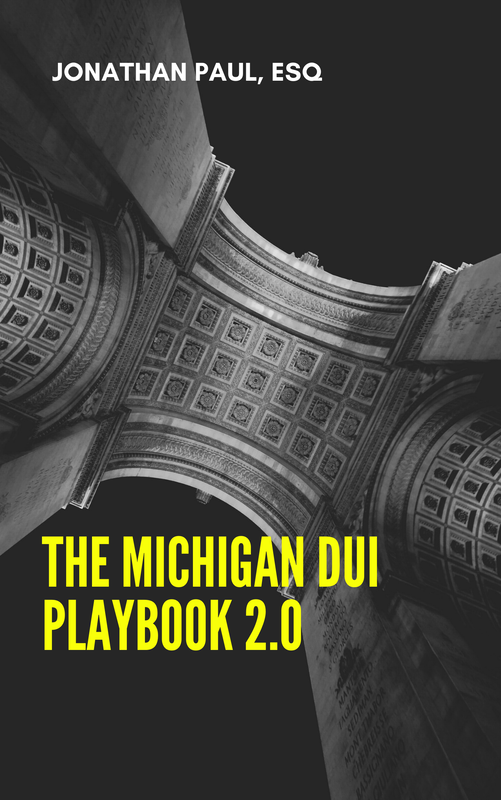|
In Michigan, when you operate a motor vehicle, you consent to certain rules. The rule book in Michigan, specifically under 2014 PA 315, provides that a person who operates a motor vehicle on a public highway or other place open to the general public or generally accessible to motor vehicles within this state, including an area designated for the parking of vehicles, is considered to have given consent to chemical tests of his or her blood, breath, or urine to determine the amount of alcohol, controlled substance, or another intoxicating substance, or any combination of them, if the person is arrested for one of the enumerated crimes in the statute, including the principal drunk driving offenses along with several other major driving offenses, and the officer has reasonable grounds to believe the driver was operating a vehicle in violation of section 625 of the Michigan Vehicle Code.
What does all that mean? It means when you drive and you refuse you provide a chemical test sample, the officer can seek a warrant and force you to provide a sample, which is typically a blood draw at the hospital. This law is in place so people can’t escape providing important evidence in their DUI case; without a chemical test, prosecutions of drunk driving cases would be a lot less effective. If arrested for a DUI in Michigan, the officer must read the Defendant his/her chemical test rights, and be asked to take a chemical test; this test can be blood, breath or urine. This test can look for alcohol, drugs or both. Along with this mandated test, the Defendant may request his/her own test. If the Defendant refuses the test, they will be forced to have blood drawn via court order, and have an automatic one year suspension of their driver’s license along with six points added to their driving record. This happens no matter the outcome of the criminal case. The Secretary of State has their own power to do this to your license merely based on the refusal. The only way to possibly prevent this suspension is by requesting an implied consent hearing within 14 days. The request information and form are attached to the temporary license provided by the police officer at the time of release from jail. The officer will be subpoenaed to this hearing where the hearing officer will evaluate four issues; the rules of evidence do not apply, and the criminal standard of reasonable doubt is not in place. Here are the four issues which can be explored at this hearing. You only need to win on one to win the hearing. Anytime a client finds themselves in this position we file the hearing request and prepare to win. Unfortunately many clients contact me when it’s too late, and do not realize the consequences of the situation. (a) Whether the peace officer had reasonable grounds to believe that the person had committed a crime described in [MCL 257.625c(1)]. (b) Whether the person was placed under arrest for a crime described in [MCL 257.625c(1)]. (c) If the person refused to submit to the test upon the request of the officer, whether the refusal was reasonable. (d) Whether the person was advised of the rights under [MCL 257.625a(6)]. The burden is on the police officer to show compliance with all four issues. While that appears to be a favorable occurrence, the standard of proof is a lot lower than criminal cases. The standard of proof at the hearing is a preponderance of the evidence (51 vs 49 percent). If the officer doesn’t show within 20 minutes of the scheduled time, the matter is dismissed; if the client does not show, the suspension goes into place on default. So how do I approach implied consent hearings? Well the first part is obtaining all of the evidence; the videos, audio, dispatch, police reports, accident reports etc. Sometimes an implied consent hearing happens before a client is even charged, because blood was drawn, which could take months to get results for the prosecutor to charge with, but the Secretary of State goes forward with the hearing. We’re looking to attack all four issues if possible, but typically you’re lucky to find an issue with one rather than all four. The first issue is “whether the peace officer had reasonable grounds to believe that the person had committed a crime described in” MCL 257.625c(1) of the Michigan Vehicle Code. This doesn’t mean a crime actually had to be committed, but rather than officer had a reasonable believe that one had been committed; a pretty low standard. Typically the officer will provide enough testimony to win on this issue. One situation where my client can win on this issue is if the officer had very little to base his arrest on. If the officer’s testimony is thin, there’s a chance of prevailing on this issue, but it’s usually not the most fruitful. The second issue that the police officer must prove at an implied consent hearing is that the person was placed under arrest for one of the crimes specified in MCL 257.625c(1). What I am looking for on this issue is the officer to testify to the crime of arrest; simply stating an arrest was made is not enough, because there are many reasons to arrest that are not under the implied consent law. If you’re arrested for reckless driving this is not under the implied consent law. Further, the person who refuses the chemical test must actually be under arrest when asked; if they are not yet under arrest then the law doesn’t apply. This situation is possible to identify by watching the videos and listening to the audio. Further, the arrest must be valid; if through cross-examination we can exploit an illegal arrest, a client can prevail on this issue. The statute states that the third issue that must be proved at an implied consent hearing is if the person refused to submit to the test upon the request of the officer, whether the refusal was reasonable.” MCL 257.625f(4)(c). This is fact specific, and could involve someone outright refusing or someone who attempts to take the test, but either the machine or the operator determine that the Defendant is not making a sincere effort to blow into the machine. An interesting situation arises when a client refuses but shortly thereafter says they will indeed take the test. Most officers will allow it as it is a lot easier to do a breath test vs going to a hospital for a blood test and to acquire a warrant in the middle of the night for a judge. This is called curing the refusal and the hearing officer will hear all sides of the story to determine the reasonableness of the refusal if the officer doesn’t allow the curing. Some common themes that arise with the third is choice of test. Under current Michigan law, the Defendant cannot choose which test to take. So if a Defendant says, yes I agree, but I will only take a urine test, that will be a refusal if the officer wants to do blood or breath. The choice is with the officer only. Another theme is right to counsel; Michigan courts have long held that the defendant has no right to counsel before or during a police-administered chemical test inasmuch as the testing procedure is not considered a critical stage in the criminal proceedings. Although this seems like a closed issue; courts have said that if a Defendant requests to call a lawyer as long as it’s a reasonable request and does not delay the process, a phone call is allowed; if that is denied then the refusal may not be reasonable and the case can be tossed out. Ultimately, the issue is whether the driver’s refusal was reasonable based on the totality of circumstances existing at the time of the refusal. If a client has hemophilia, diabetes or a condition requiring the use of an anticoagulant under the direction of a doctor then the Defendant does not need to consent to the withdrawal of blood. It would be reasonable under the law for this person to refuse, and the sanctions would not apply. The fourth and last issue the police must prove at an implied consent hearing is that the Defendant was advised of the chemical test rights stated in MCL 257.625a(6)(b), which provides that a person arrested for one of the crimes enumerated in MCL 257.625c(1) must be advised of all of the following: (i) If he or she takes a chemical test of his or her blood, urine, or breath administered at the request of a peace officer, he or she has the right to demand that a person of his or her own choosing administer 1 of the chemical tests. (ii) The results of the test are admissible in a judicial proceeding as provided under this act and will be considered with other admissible evidence in determining the defendant’s innocence or guilt. (iii) He or she is responsible for obtaining a chemical analysis of a test sample obtained at his or her own request. (iv) If he or she refuses the request of a peace officer to take a test described in subparagraph (i), a test shall not be given without a court order, but the peace officer may seek to obtain a court order. (v) Refusing a peace officer’s request to take a test described in subparagraph (i) will result in the suspension of his or her operator’s or chauffeur’s license and vehicle group designation or operating privilege and in the addition of 6 points to his or her driver record. These instructions are listed on the back of the Officer’s Report of Refusal to Submit to Chemical Test and Michigan Temporary Driving Permit, which is handed to you. An officer will typically read it word for word and let you look at it; the officer will usually put his initials on the paperwork to indicate it was read. When I am reviewing this issue, I review the form itself, and the audio and video, which may have recorded the reading of the rights. What I’m looking for in this situation is for the video or audio to show that the instructions were not read properly or the conversation between my client and the police officer contained inconsistent or improper information. Sometimes a Defendant asks for additional information or advice; the officer is trained to not engage in these requests, and just stick to the script, but many officers don’t do that. If the officer says the wrong thing or misleads or confuses my client outside the chemical test rights then we may have a winner on issue four. Comments are closed.
|
Click to Email Me Categories
All
|
Ann Arbor Office LocationPlymouth Office Location |
Representing DUI Clients in MichiganRepresenting clients charged with a DUI in Ann Arbor, Canton, Brighton, Howell, Saline, Adrian, Taylor, Plymouth, Northville, Westland, Ypsilanti, Pittsfield Towsnhip, Warren, Sterling Heights, Farmington, Pontiac, Romulus, Lansing, Novi, South Lyon, Southfield, Birmingham, Bloomfield Hills, Royal Oak, Troy, Rochester, Jackson, East Lansing, Garden City, Livonia, Dearborn, Detroit, St Clair Shores, Hazel Park, Ferndale, Madison Heights, Waterford, Milford, Shelby Township Clarkston, Oak Park, Berkley, Fraser, Sterling Heights, Clinton Township and others throughout Washtenaw, Wayne, Monroe, Jackson, Genesee, Macomb, Ingham, Lenawee, Livingston and Oakland County.
|







